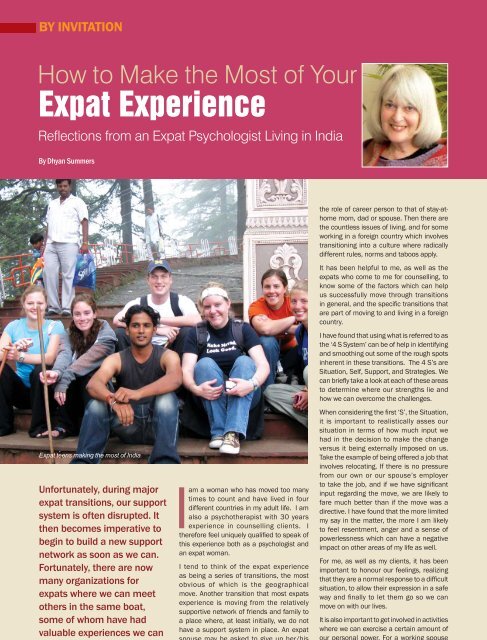to view Expat - LB Associates
to view Expat - LB Associates
to view Expat - LB Associates
You also want an ePaper? Increase the reach of your titles
YUMPU automatically turns print PDFs into web optimized ePapers that Google loves.
BY INVITATION<br />
How <strong>to</strong> Make the Most of Your<br />
<strong>Expat</strong> Experience<br />
Refl ections from an <strong>Expat</strong> Psychologist Living in India<br />
By Dhyan Summers<br />
the role of career person <strong>to</strong> that of stay-athome<br />
mom, dad or spouse. Then there are<br />
the countless issues of living, and for some<br />
working in a foreign country which involves<br />
transitioning in<strong>to</strong> a culture where radically<br />
different rules, norms and taboos apply.<br />
It has been helpful <strong>to</strong> me, as well as the<br />
expats who come <strong>to</strong> me for counselling, <strong>to</strong><br />
know some of the fac<strong>to</strong>rs which can help<br />
us successfully move through transitions<br />
in general, and the specifi c transitions that<br />
are part of moving <strong>to</strong> and living in a foreign<br />
country.<br />
I have found that using what is referred <strong>to</strong> as<br />
the ‘4 S System’ can be of help in identifying<br />
and smoothing out some of the rough spots<br />
inherent in these transitions. The 4 S’s are<br />
Situation, Self, Support, and Strategies. We<br />
can briefl y take a look at each of these areas<br />
<strong>to</strong> determine where our strengths lie and<br />
how we can overcome the challenges.<br />
<strong>Expat</strong> teens making the most of India<br />
Unfortunately, during major<br />
expat transitions, our support<br />
system is often disrupted. It<br />
then becomes imperative <strong>to</strong><br />
begin <strong>to</strong> build a new support<br />
network as soon as we can.<br />
Fortunately, there are now<br />
many organizations for<br />
expats where we can meet<br />
others in the same boat,<br />
some of whom have had<br />
valuable experiences we can<br />
I<br />
am a woman who has moved <strong>to</strong>o many<br />
times <strong>to</strong> count and have lived in four<br />
different countries in my adult life. I am<br />
also a psychotherapist with 30 years<br />
experience in counselling clients. I<br />
therefore feel uniquely qualifi ed <strong>to</strong> speak of<br />
this experience both as a psychologist and<br />
an expat woman.<br />
I tend <strong>to</strong> think of the expat experience<br />
as being a series of transitions, the most<br />
obvious of which is the geographical<br />
move. Another transition that most expats<br />
experience is moving from the relatively<br />
supportive network of friends and family <strong>to</strong><br />
a place where, at least initially, we do not<br />
have a support system in place. An expat<br />
When considering the fi rst ‘S’, the Situation,<br />
it is important <strong>to</strong> realistically asses our<br />
situation in terms of how much input we<br />
had in the decision <strong>to</strong> make the change<br />
versus it being externally imposed on us.<br />
Take the example of being offered a job that<br />
involves relocating. If there is no pressure<br />
from our own or our spouse’s employer<br />
<strong>to</strong> take the job, and if we have signifi cant<br />
input regarding the move, we are likely <strong>to</strong><br />
fare much better than if the move was a<br />
directive. I have found that the more limited<br />
my say in the matter, the more I am likely<br />
<strong>to</strong> feel resentment, anger and a sense of<br />
powerlessness which can have a negative<br />
impact on other areas of my life as well.<br />
For me, as well as my clients, it has been<br />
important <strong>to</strong> honour our feelings, realizing<br />
that they are a normal response <strong>to</strong> a diffi cult<br />
situation, <strong>to</strong> allow their expression in a safe<br />
way and fi nally <strong>to</strong> let them go so we can<br />
move on with our lives.<br />
It is also important <strong>to</strong> get involved in activities<br />
where we can exercise a certain amount of






